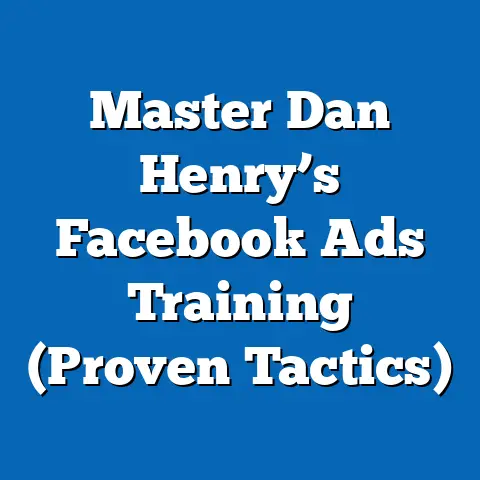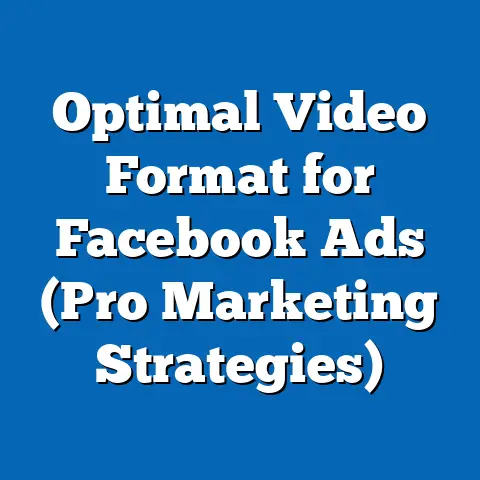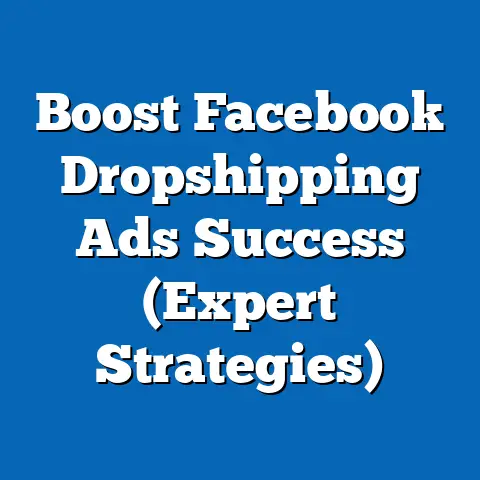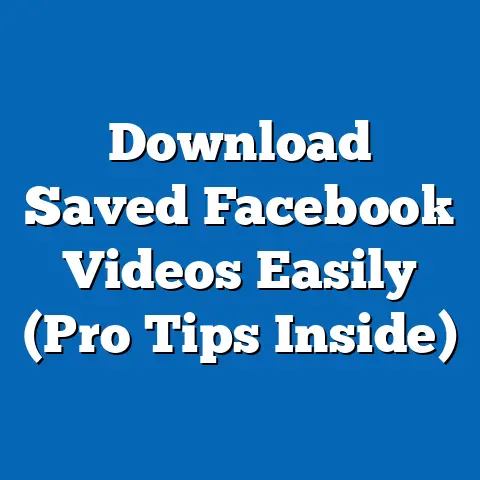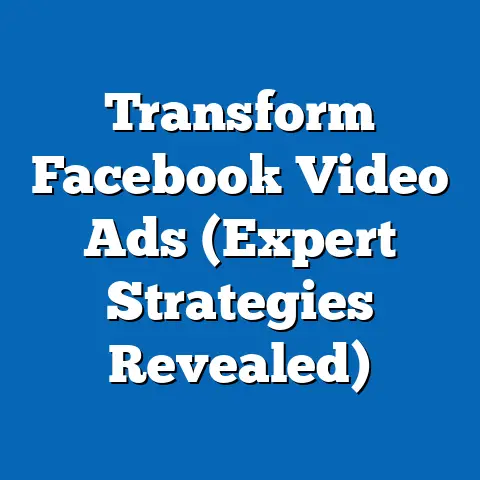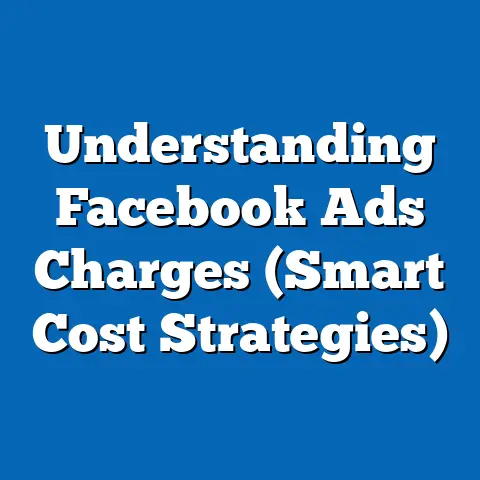Transform Real Estate Ads on Facebook (Unlock Hidden Potential)
I’ve seen firsthand how the real estate industry has transformed. It used to be all about newspaper ads and open houses. Now, it’s a digital game, and Facebook ads are leading the charge. In the fiercely competitive world of real estate, the key to unparalleled success lies not just in traditional marketing methods, but in the revolutionary power of Facebook ads—where hidden potential transforms mere listings into irresistible opportunities. I want to show you how to unlock that potential and turn your Facebook ads into lead-generating machines.
The Shift in Real Estate Marketing
The real estate industry has undergone a massive transformation in recent years. Remember the days of relying solely on newspaper ads, flyers, and open houses? While those methods still hold some value, the digital revolution has completely reshaped how properties are bought and sold. I remember when I first started in real estate marketing, the internet was just becoming a thing. We were hesitant to embrace it fully, but now it’s hard to imagine a successful real estate business without a strong online presence.
From Print to Pixels: The Digital Evolution
The shift from traditional print media to digital platforms like Facebook has been driven by several factors. First, the vast majority of potential homebuyers and sellers are now online. They’re scrolling through social media, searching for properties on their phones, and conducting research from the comfort of their homes.
According to the National Association of Realtors (NAR), 97% of homebuyers used the internet in their home search process. This statistic alone underscores the importance of having a strong online presence. Furthermore, a significant portion of this online activity takes place on social media, with Facebook being a dominant player.
Social Media: The New Real Estate Playground
Social media, and Facebook in particular, has become the new playground for real estate marketing. It’s where potential clients are spending their time, and it’s where you need to be to capture their attention. But simply having a Facebook page isn’t enough. You need a strategic approach to advertising that leverages the platform’s powerful targeting capabilities.
Think about it: Facebook allows you to target potential buyers based on their demographics, interests, behaviors, and even their location. You can reach people who are actively searching for homes in your area, or those who have expressed interest in real estate-related topics. This level of precision is simply unmatched by traditional marketing methods.
Case Studies: Real-World Success with Facebook Ads
I’ve seen countless real estate agents and firms achieve remarkable results with Facebook ads. Let me share a couple of examples:
-
Example 1: The Suburban Specialist: A real estate agent specializing in suburban family homes used Facebook ads to target young families in the surrounding area. They created visually appealing ads showcasing spacious homes with large yards, targeting parents with children under the age of 10. The result? A 40% increase in leads and a significant boost in sales within the target demographic.
-
Example 2: The Luxury Listing Expert: A real estate firm focusing on luxury properties used Facebook video ads to showcase stunning homes with breathtaking views. They targeted high-income individuals with an interest in luxury living and travel. The result? A 30% increase in inquiries for high-end properties and a stronger brand reputation within the luxury market.
Example 1: The Suburban Specialist: A real estate agent specializing in suburban family homes used Facebook ads to target young families in the surrounding area. They created visually appealing ads showcasing spacious homes with large yards, targeting parents with children under the age of 10. The result? A 40% increase in leads and a significant boost in sales within the target demographic.
Example 2: The Luxury Listing Expert: A real estate firm focusing on luxury properties used Facebook video ads to showcase stunning homes with breathtaking views. They targeted high-income individuals with an interest in luxury living and travel. The result? A 30% increase in inquiries for high-end properties and a stronger brand reputation within the luxury market.
These are just two examples of how Facebook ads can transform your real estate business. The key is to understand the platform, craft compelling ads, and target the right audience.
Key Takeaway: The real estate industry has shifted dramatically towards digital marketing, with Facebook ads playing a crucial role. By understanding the platform and leveraging its targeting capabilities, you can reach a wider audience, generate more leads, and ultimately boost your sales.
Understanding the Facebook Advertising Ecosystem
Before diving into the specifics of creating compelling real estate ads, it’s essential to understand the Facebook advertising ecosystem. It’s a complex but powerful system that, once mastered, can deliver incredible results.
How Facebook Advertising Works
At its core, Facebook advertising is a system that allows businesses to display ads to users based on their demographic information, interests, and behaviors. Facebook collects vast amounts of data about its users, which advertisers can then use to target their ads with laser-like precision.
The process typically involves:
- Creating an Ad Campaign: Defining your objective, target audience, and budget.
- Designing Your Ad: Choosing the ad format, visuals, and copy.
- Setting Your Bidding Strategy: Determining how much you’re willing to pay for each click or impression.
- Tracking and Optimizing: Monitoring your ad performance and making adjustments as needed.
Ad Formats: Choosing the Right Fit
Facebook offers a variety of ad formats, each with its own strengths and weaknesses. For real estate, some of the most effective formats include:
- Image Ads: Simple and visually appealing, ideal for showcasing a single property.
- Video Ads: Engaging and informative, perfect for virtual tours or showcasing the lifestyle associated with a property. I’ve found videos to be incredibly effective, especially when they tell a story or highlight the unique features of a home.
- Carousel Ads: Allow you to showcase multiple images or videos in a single ad, ideal for highlighting different aspects of a property or multiple listings.
- Collection Ads: Designed for mobile devices, these ads allow users to browse a catalog of products or properties directly within the Facebook app.
- Lead Ads: Specifically designed to capture leads, these ads include a built-in form that users can fill out without leaving the Facebook app. This can be a game-changer for generating high-quality leads.
The Facebook Ads Manager: Your Command Center
The Facebook Ads Manager is your command center for all things advertising. It’s where you create campaigns, design ads, set your budget, track performance, and make adjustments. It can seem overwhelming at first, but I promise, with a little practice, you’ll become a pro.
Some key features of the Ads Manager include:
- Campaign Creation: Define your campaign objective, such as lead generation, website traffic, or brand awareness.
- Audience Targeting: Target your ads based on demographics, interests, behaviors, and location.
- Ad Placement: Choose where your ads will appear, such as Facebook News Feed, Instagram Feed, or Audience Network.
- Budget and Scheduling: Set your daily or lifetime budget and schedule when your ads will run.
- Reporting and Analytics: Track your ad performance and gain insights into what’s working and what’s not.
Audience Segmentation: Reaching the Right People
One of the most powerful aspects of Facebook advertising is its ability to target specific audiences. This is crucial for real estate, as you want to reach people who are actively looking to buy or sell a property in your area.
Here are some key audience segmentation options:
- Demographics: Target based on age, gender, education, income, and other demographic factors.
- Interests: Target based on interests related to real estate, such as home improvement, interior design, or specific neighborhoods.
- Behaviors: Target based on online behaviors, such as browsing real estate websites or attending open houses.
- Location: Target based on geographic location, allowing you to reach people in specific cities, counties, or even zip codes.
- Custom Audiences: Upload your own customer lists or website visitor data to create custom audiences for retargeting.
- Lookalike Audiences: Create audiences that are similar to your existing customers or website visitors, allowing you to expand your reach to new potential clients.
Key Takeaway: Understanding the Facebook advertising ecosystem is crucial for success. By mastering the Ads Manager, choosing the right ad formats, and segmenting your audience effectively, you can create highly targeted campaigns that deliver exceptional results.
Crafting Compelling Real Estate Ads
Now that you understand the basics of Facebook advertising, let’s dive into the art of crafting compelling real estate ads. This is where your creativity and marketing skills come into play.
Visuals: Capturing Attention with Stunning Imagery
In the world of real estate, visuals are everything. High-quality images and videos are essential for capturing attention and showcasing the beauty and potential of your properties. I always tell my clients: “Your visuals are your first impression. Make it count!”
Here are some tips for creating stunning visuals:
- Use High-Resolution Images: Avoid blurry or pixelated images. Invest in professional photography or videography to showcase your properties in the best possible light.
- Highlight Key Features: Focus on the features that make your property unique, such as stunning views, spacious interiors, or luxurious amenities.
- Showcase the Lifestyle: Don’t just show the property itself. Show the lifestyle associated with it. Include images of people enjoying the space, whether it’s a family playing in the backyard or a couple relaxing on the balcony.
- Use Video to Tell a Story: Video is a powerful tool for engaging potential buyers. Create virtual tours that showcase the property in detail, or tell a story about the lifestyle associated with the home.
- Optimize for Mobile: Remember that most Facebook users are on mobile devices. Make sure your visuals are optimized for mobile viewing, with clear and easy-to-see details.
Copywriting: Words That Sell
While visuals are important, the words you use in your ad copy are equally crucial. Your ad copy should be clear, concise, and compelling, conveying a sense of urgency and exclusivity.
Here are some tips for writing effective ad copy:
- Highlight Key Benefits: Focus on the benefits of the property, rather than just the features. For example, instead of saying “3 bedrooms, 2 bathrooms,” say “Enjoy spacious living with 3 bedrooms and 2 luxurious bathrooms.”
- Create a Sense of Urgency: Use words like “limited time,” “exclusive offer,” or “don’t miss out” to create a sense of urgency and encourage people to take action.
- Use Strong Call to Actions: Tell people exactly what you want them to do, such as “Learn More,” “Schedule a Viewing,” or “Download Our Free Guide.”
- Target Your Audience: Tailor your ad copy to your target audience. For example, if you’re targeting young families, use language that resonates with them, such as “Perfect for raising a family” or “Close to top-rated schools.”
- Keep it Concise: People have short attention spans on social media. Keep your ad copy concise and to the point.
Branding: Consistency is Key
Your brand is your identity, and it’s important to maintain consistency across all your ads. This includes using the same logo, colors, fonts, and messaging.
Here are some tips for maintaining brand consistency:
- Use Your Logo: Include your logo in all your ads to reinforce your brand identity.
- Use Consistent Colors and Fonts: Choose a color palette and font that are consistent with your brand and use them in all your ads.
- Maintain a Consistent Tone of Voice: Use a consistent tone of voice in your ad copy, whether it’s professional, friendly, or humorous.
- Showcase Your Unique Value Proposition: Highlight what makes your brand unique and why people should choose you over the competition.
Key Takeaway: Crafting compelling real estate ads requires a combination of stunning visuals, persuasive copywriting, and consistent branding. By following these tips, you can create ads that capture attention, generate leads, and drive sales.
Leveraging Facebook’s Features for Maximum Impact
Facebook offers a range of features that can be leveraged to maximize the impact of your real estate ads. Let’s explore some of the most effective options.
Dynamic Ads for Real Estate: Personalized Property Recommendations
Dynamic ads for real estate are a game-changer for showcasing relevant properties to potential buyers. These ads automatically display properties based on users’ interests, behaviors, and location.
Here’s how they work:
- Upload Your Property Catalog: Upload your property listings to Facebook’s catalog manager.
- Set Up Your Targeting: Define your target audience based on demographics, interests, and behaviors.
- Facebook Does the Rest: Facebook automatically displays relevant properties to users based on their browsing history and preferences.
Dynamic ads are particularly effective for retargeting users who have previously viewed properties on your website or app. They allow you to show them the exact properties they were interested in, increasing the likelihood of a conversion.
Lead Generation Forms: Capture Leads Directly on Facebook
Lead generation forms are a powerful tool for capturing leads directly on Facebook. These forms allow users to fill out their contact information without leaving the Facebook app, making it incredibly easy to generate high-quality leads.
Here are some tips for creating effective lead generation forms:
- Keep it Simple: Ask for only the essential information, such as name, email address, and phone number.
- Offer an Incentive: Offer a free guide, consultation, or other incentive in exchange for their contact information.
- Use Clear and Concise Language: Explain the benefits of providing their contact information and what they can expect to receive in return.
- Follow Up Promptly: Respond to leads quickly and provide them with the information they requested.
Facebook Live: Virtual Tours and Q&A Sessions
Facebook Live is a fantastic way to engage with potential clients in real-time. You can use it to host virtual tours of properties, conduct Q&A sessions, or share valuable insights about the local real estate market.
Here are some tips for using Facebook Live effectively:
- Promote Your Live Stream in Advance: Let people know when you’ll be going live and what they can expect to see.
- Choose a Compelling Topic: Choose a topic that is relevant to your target audience, such as “Top 5 Tips for Buying a Home” or “Virtual Tour of a Stunning Waterfront Property.”
- Engage with Your Audience: Respond to comments and questions in real-time to create a more interactive experience.
- Record Your Live Stream: Save your live stream so that people who missed it can watch it later.
Retargeting Ads: Reaching Engaged Prospects
Retargeting ads are a powerful way to reach users who have previously interacted with your website, app, or Facebook page. These ads allow you to show them relevant content and encourage them to take the next step.
Here are some examples of how you can use retargeting ads:
- Show Users Properties They Viewed: If someone viewed a specific property on your website, show them a retargeting ad featuring that property.
- Offer a Free Consultation: If someone downloaded a free guide from your website, offer them a free consultation to discuss their real estate needs.
- Promote Your Upcoming Open House: If someone liked your Facebook page, promote your upcoming open house to encourage them to attend.
Facebook Messenger: Real-Time Communication
Facebook Messenger provides a convenient way to communicate with potential clients in real-time. You can use it to answer questions, schedule viewings, or provide personalized recommendations.
Here are some tips for using Facebook Messenger effectively:
- Respond Promptly: Respond to messages quickly to show that you’re attentive and responsive.
- Provide Personalized Recommendations: Use Messenger to provide personalized property recommendations based on their needs and preferences.
- Schedule Viewings: Use Messenger to schedule viewings and provide directions to the property.
- Use Chatbots to Automate Responses: Use chatbots to automate responses to common questions and provide 24/7 support.
Key Takeaway: Facebook offers a range of features that can be leveraged to maximize the impact of your real estate ads. By using dynamic ads, lead generation forms, Facebook Live, retargeting ads, and Facebook Messenger, you can engage with potential clients in a more personalized and effective way.
Measuring Success and Optimizing Campaigns
Creating effective Facebook ads is just the first step. You also need to measure your success and optimize your campaigns to ensure you’re getting the best possible results.
Key Performance Indicators (KPIs) for Real Estate Ads
Key Performance Indicators (KPIs) are metrics that you can use to track the performance of your ads and determine whether they’re achieving your objectives.
Here are some key KPIs for real estate ads:
- Click-Through Rate (CTR): The percentage of people who click on your ad after seeing it. A high CTR indicates that your ad is relevant and engaging.
- Conversion Rate: The percentage of people who take a desired action after clicking on your ad, such as filling out a lead generation form or scheduling a viewing. A high conversion rate indicates that your ad is effective at driving results.
- Cost Per Click (CPC): The amount you pay each time someone clicks on your ad. A low CPC indicates that your ad is efficient at driving traffic.
- Cost Per Lead (CPL): The amount you pay for each lead you generate through your ads. A low CPL indicates that your ad is effective at generating leads.
- Return on Ad Spend (ROAS): The amount of revenue you generate for every dollar you spend on advertising. A high ROAS indicates that your ad is profitable.
Tracking and Analyzing Ad Performance
Facebook provides a range of tools for tracking and analyzing ad performance, including:
- Facebook Ads Manager: Provides detailed reports on your ad performance, including impressions, clicks, conversions, and cost per result.
- Facebook Analytics: Allows you to track user behavior on your website or app and gain insights into how people are interacting with your content.
- Third-Party Analytics Tools: There are a variety of third-party analytics tools that can provide more advanced tracking and reporting capabilities.
A/B Testing: Finding What Works Best
A/B testing is a process of comparing two versions of an ad to see which one performs better. This is a valuable tool for optimizing your ads and improving your results.
Here are some elements you can A/B test:
- Visuals: Test different images or videos to see which ones are more engaging.
- Copy: Test different ad copy to see which one resonates best with your target audience.
- Call to Action: Test different call to actions to see which one drives the most conversions.
- Targeting: Test different targeting options to see which ones are most effective at reaching your target audience.
Optimizing Your Campaigns: Continuous Improvement
Optimizing your campaigns is an ongoing process. You should continuously track your ad performance, analyze your results, and make adjustments as needed.
Here are some tips for optimizing your campaigns:
- Refine Your Targeting: Continuously refine your targeting to ensure you’re reaching the right people.
- Improve Your Ad Copy: Experiment with different ad copy to see what resonates best with your target audience.
- Test Different Visuals: Test different images or videos to see which ones are more engaging.
- Adjust Your Bidding Strategy: Adjust your bidding strategy to ensure you’re getting the best possible results for your budget.
- Pause Underperforming Ads: Pause ads that are not performing well to avoid wasting your budget.
Key Takeaway: Measuring success and optimizing your campaigns is crucial for maximizing the impact of your real estate ads. By tracking key KPIs, analyzing your results, and A/B testing different elements, you can continuously improve your campaigns and drive better results.
Case Studies and Success Stories
To further illustrate the transformative power of Facebook ads in the real estate industry, let’s delve into some real-life case studies and success stories.
Case Study 1: The Rural Realtor
Objective: A realtor specializing in rural properties wanted to increase leads and sales in a sparsely populated area.
Strategy:
- Targeted Facebook Ads: The realtor created Facebook ads targeting people living in nearby urban areas who expressed interest in outdoor activities, gardening, and a quieter lifestyle.
- Visually Appealing Ads: The ads featured stunning photos of rural properties with large yards, gardens, and scenic views.
- Lead Generation Forms: The ads included lead generation forms that allowed users to request more information about specific properties.
Results:
- Increased Leads: The realtor generated a significant increase in leads from people who were interested in moving to the rural area.
- Boost in Sales: The realtor closed several deals with clients who found her through Facebook ads.
Lessons Learned:
- Targeting is Key: Even in sparsely populated areas, targeted Facebook ads can be effective at reaching the right audience.
- Visuals Matter: Stunning visuals are essential for capturing attention and showcasing the appeal of rural properties.
- Lead Generation Forms Simplify the Process: Lead generation forms make it easy for potential buyers to request more information.
Case Study 2: The Urban Condo Specialist
Objective: A realtor specializing in urban condos wanted to attract young professionals and millennials to specific condo buildings in the city.
Strategy:
- Hyper-Local Targeting: The realtor created Facebook ads targeting people who lived or worked within a few blocks of the condo buildings.
- Lifestyle-Oriented Ads: The ads featured photos and videos of people enjoying the amenities of the condo buildings, such as rooftop pools, fitness centers, and co-working spaces.
- Virtual Tours: The realtor created virtual tours of the condo buildings and shared them on Facebook Live.
Results:
- Increased Engagement: The ads generated high levels of engagement, with people liking, commenting, and sharing the posts.
- More Inquiries: The realtor received a surge in inquiries about the condo buildings.
- Faster Sales: The realtor was able to sell condos more quickly and at higher prices.
Lessons Learned:
- Hyper-Local Targeting Works: Targeting people who live or work near specific properties can be highly effective.
- Showcase the Lifestyle: Emphasize the lifestyle associated with the property, rather than just the features.
- Virtual Tours are a Game-Changer: Virtual tours allow potential buyers to experience the property from the comfort of their own homes.
Case Study 3: The Luxury Home Broker
Objective: A luxury home broker wanted to reach high-net-worth individuals who were interested in buying or selling luxury properties.
Strategy:
- Targeted Facebook Ads: The broker created Facebook ads targeting people with high incomes, interests in luxury goods, and travel.
- High-End Visuals: The ads featured stunning photos and videos of luxurious homes with breathtaking views and high-end amenities.
- Exclusive Events: The broker hosted exclusive events for potential buyers and promoted them on Facebook.
Results:
- Increased Brand Awareness: The ads helped the broker establish herself as a leading expert in the luxury home market.
- More Referrals: The broker received more referrals from satisfied clients.
- Higher Sales Prices: The broker was able to sell luxury homes at higher prices.
Lessons Learned:
- Target the Right Audience: Targeting high-net-worth individuals is essential for success in the luxury home market.
- Invest in High-End Visuals: Luxury homes require high-end visuals to showcase their beauty and value.
- Exclusive Events Create Buzz: Hosting exclusive events can generate buzz and attract potential buyers.
Key Takeaway: These case studies demonstrate the transformative power of Facebook ads in the real estate industry. By understanding the platform, crafting compelling ads, and targeting the right audience, you can achieve remarkable results in your real estate ventures.
Future Trends in Facebook Advertising for Real Estate
The world of digital marketing is constantly evolving, and Facebook advertising is no exception. To stay ahead of the curve, it’s important to be aware of emerging trends and how they might impact your real estate advertising strategies.
AI-Driven Targeting: The Future of Precision
Artificial intelligence (AI) is already playing a significant role in Facebook advertising, and its influence is only going to grow in the future. AI-driven targeting allows you to reach potential clients with even greater precision, based on their behavior, interests, and demographics.
Here are some ways AI is being used in Facebook advertising:
- Predictive Targeting: AI algorithms can analyze vast amounts of data to predict which users are most likely to be interested in your properties.
- Personalized Ad Experiences: AI can personalize ad experiences based on individual user preferences.
- Automated Optimization: AI can automatically optimize your campaigns to improve performance.
Augmented Reality (AR) Property Tours: Immersive Experiences
Augmented reality (AR) is a technology that overlays digital information onto the real world. In the context of real estate, AR can be used to create immersive property tours that allow potential buyers to experience a property from the comfort of their own homes.
Imagine being able to walk through a virtual version of a house, explore the rooms, and even customize the decor, all from your smartphone or tablet. This is the power of AR, and it’s likely to become a major trend in real estate advertising in the coming years.
The Rise of Video Content: Engaging and Informative
Video content is already a dominant force in digital marketing, and its importance is only going to increase in the future. Video is a highly engaging and informative medium that can be used to showcase properties, tell stories, and connect with potential clients on a deeper level.
Here are some ways you can use video content in your real estate advertising:
- Virtual Tours: Create virtual tours of properties that allow potential buyers to experience the space from the comfort of their own homes.
- Lifestyle Videos: Create videos that showcase the lifestyle associated with a property, such as a family playing in the backyard or a couple relaxing on the balcony.
- Testimonials: Share testimonials from satisfied clients to build trust and credibility.
- Q&A Sessions: Host Q&A sessions on Facebook Live to answer questions from potential clients.
Personalized Advertising: Tailoring the Message
Personalized advertising is all about tailoring your message to the individual user. This can involve using their name, referencing their location, or highlighting properties that match their specific interests.
Here are some ways you can personalize your Facebook ads:
- Use Dynamic Creative: Use dynamic creative to automatically display different images, videos, and ad copy based on user preferences.
- Target Specific Audiences: Create highly targeted audiences based on demographics, interests, and behaviors.
- Use Custom Audiences: Use custom audiences to retarget users who have previously interacted with your website or app.
The Metaverse and Real Estate: A New Frontier
The Metaverse is a virtual world where people can interact with each other, play games, and even buy and sell virtual real estate. While the Metaverse is still in its early stages, it has the potential to revolutionize the real estate industry.
Imagine being able to tour virtual properties, attend virtual open houses, and even buy and sell virtual land, all within the Metaverse. This is the future of real estate, and it’s closer than you might think.
Key Takeaway: The landscape of real estate advertising on Facebook is constantly evolving. By staying aware of emerging trends and adapting your strategies accordingly, you can maintain a competitive edge and continue to achieve remarkable results.
Conclusion
In conclusion, Facebook ads are a transformative tool for real estate professionals looking to unlock hidden potential and achieve remarkable results. By embracing this digital revolution, you can reach a wider audience, generate more leads, and ultimately boost your sales.
I’ve covered a lot in this guide, from understanding the basics of Facebook advertising to crafting compelling ads, leveraging Facebook’s features, measuring success, and exploring future trends. I hope this information has been helpful and inspiring.
Now, it’s time to take action. Start experimenting with Facebook ads, track your results, and continuously optimize your campaigns. The world of real estate is changing, and those who embrace the power of digital marketing will be the ones who thrive. Remember, the key to success is not just about being present online, but about being strategic, creative, and adaptable. The potential is there, waiting to be unlocked. Go out there and transform your real estate business with the power of Facebook ads!

